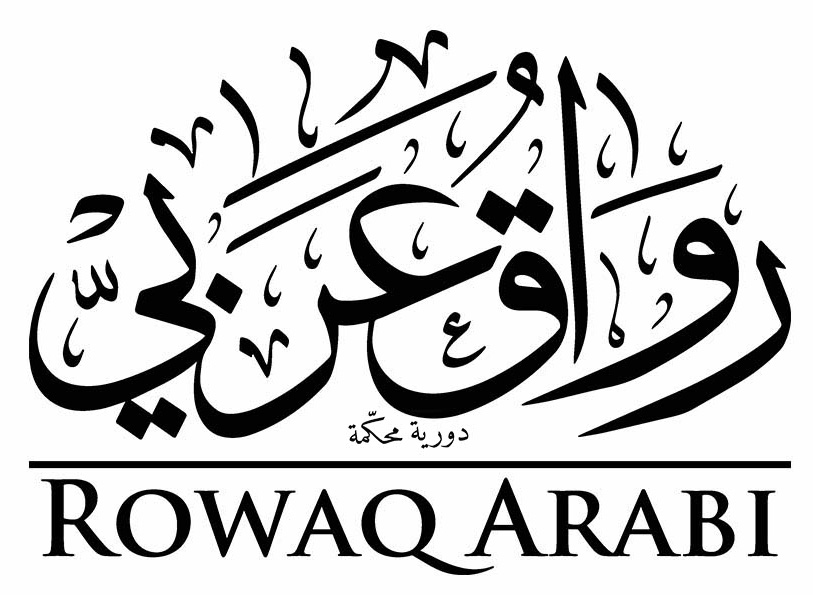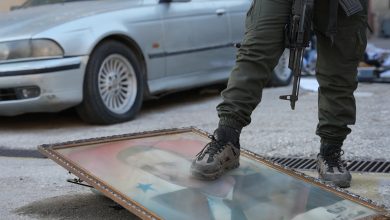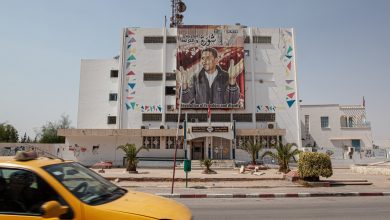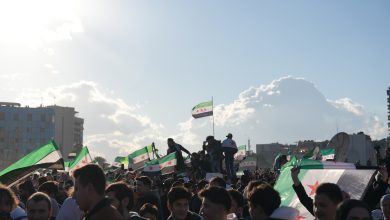Views: Challenges to the Democratic Transition in Tunisia
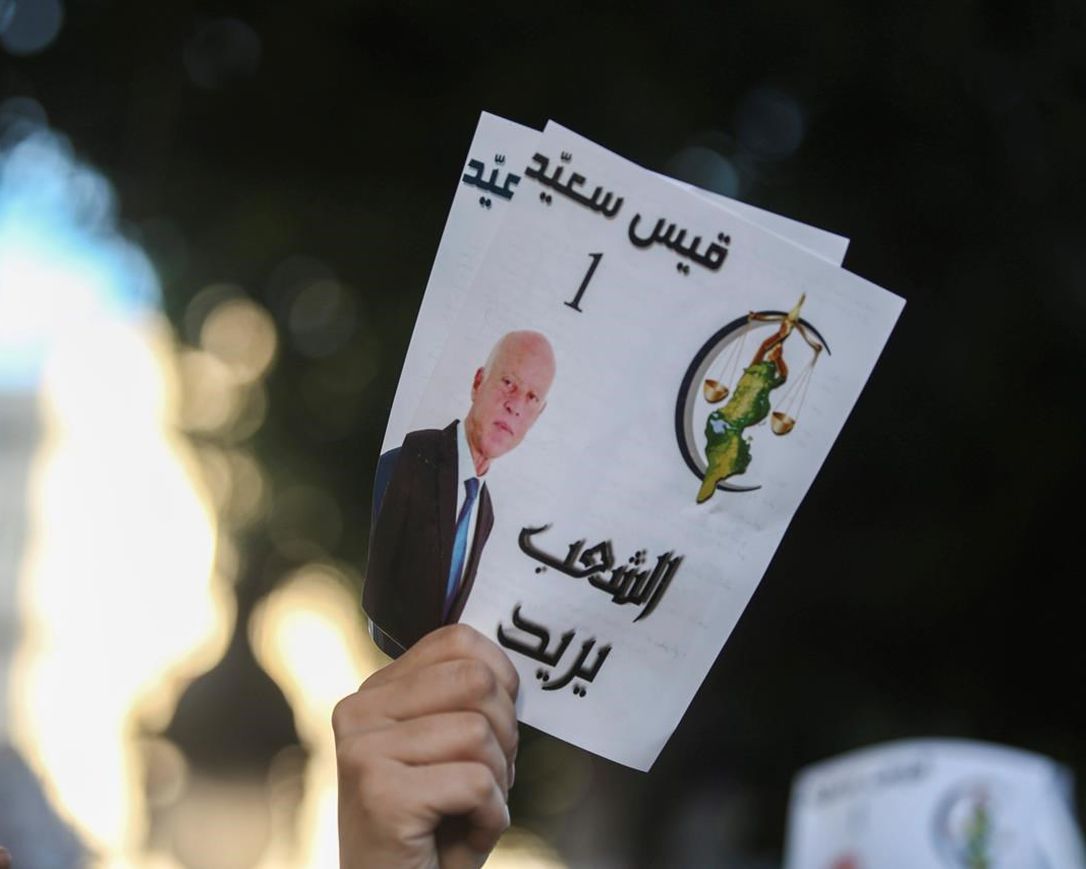
With President Beji Caid Essebsi’s death before the end of his term, it became necessary to conduct the first round of the presidential elections before the legislative elections. The elections had a long list of candidates (26), among whom were prominent names: ex-Prime ministers, current and ex-ministers, and partisan leaders. They all failed to reach round two of the elections, which witnessed strong competition between two candidates who came from outside the ruling class.
The legislative elections came to confirm the extent of Tunisians’ unhappiness with the old regime and all of its symbols. The voter turnout was no more than 41%. Ennahda managed to attain a limited electoral win, after losing more seats in the Parliament compared to the number of seats it had in 2011. Some parties disappeared, like Nidaa Tunis, which was established by the ex-President and had won a parliamentarian majority in 2014 before it became fragmented over internal conflicts. The same happened with the leftist Popular Front party, which experienced an unprecedented decline. The election results led to a mosaic of parties inconsistent in their goals and platforms, which makes it difficult to form a cabinet with the consent of a parliamentarian majority.
With the conclusion of the second round of the presidential elections, Kais Saied, a Constitutional Law professor, took office. He was an independent candidate who ran in the second round against Nabil Karoui, a businessman who owns Nessma TV station. Karoui spent most of his campaign in prison over a legal contestation put forward by the “I am Awake [Ana Yaqiz]” organization, in relation to tax evasion and money laundering.
With the competition between Kais Saied and Nabil Karoui in the second round, commentators focused on the indignation of Tunisians against the old regime and all of its agreements and conflicts. Moreover, the significant victory achieved by the President (with more than 70% of the votes) proved that the younger generation who led his campaign – with limited capacities and funding – wanted to open a new era of governance as a way of regaining the values of the revolution; a revolution that they believe was stolen from them. In such a context, Saied’s campaign witnessed the prominence of the central revolutionary slogan “The People Want.”
However, as much as this new turn speaks to the hopes of the younger generation who see the presidential election results as a success for the campaign they led and a victory for their values and principles, it also raises concerns from observers of current affairs. These concerns are justified because of the economic and social challenges facing a country experiencing an ever-deteriorating crisis and indebtedness, accumulating day after day, with financial corruption that mixes politics with business, and with most aspects of economic life.[1] There are other challenges as well, related to finishing the job of building constitutional institutions, and concerns over a relapse in the gains achieved over the last eight years, which include freedom of expression, freedom of the press, and many other freedoms.
The Elections and Recalling the Revolution’s Slogans
The elections witnessed the strong return of revolutionary slogans during the presidential campaigns, be it through protest movements or through social media. This included operationalizing the slogans of “The People Want,” “Work is an entitlement, you gang of thieves!”, and many other slogans that connect dignity to freedom. This is because after eight years into the Revolution, the main concerns of the people are still side-lined. Economic gaps between the internal regions of Tunisia and the coast are becoming wider.
Unemployment rates are higher. The middle class – the backbone of stability since independence – is losing out and becoming increasingly poor. This is due to tax injustice targeting the middle class, and due to price hikes and inflation exceeding 7% annually. The National Statistics Institute stated that 1.7 million people are now poor (from among 11 million), and that 300 thousand Tunisians are living under the poverty line.[2]
Moreover, financial corruption has worsened as the state has weakened; weak accountability laws enabled the rise of a new elite who profited from tax evasion and money laundering, until the buzz on the “democratization of corruption,” began to be heard, which went hand in hand with the democratization of political life. Simultaneously, regional divisions between the coast and the internal districts that we saw when Bourguiba and Ben Ali were in office returned once again.[3]
Has the Younger Generation Recaptured the Revolutionary Path?
Kais Saied, the elected president, achieved a landslide victory with over 70% of the votes; a percentage surpassing any other since the revolution erupted. No other candidate or party achieved over 2.7 million votes. The young generation flocked to polling stations this time, and over 90% of voters between 18 and 25 years old voted for the elected president.[4] They are the same generation that led his campaign through social media, although they lacked political support or the support of political parties. They also had very limited financial resources, because Saied not only refused public funding for the campaign, but he also refused any funding from powerful businesspeople. He was keen on having the young generation lead the campaign, even with limited resources. Upon his victory announcement, Kais Saied thanked the young generation who supported his campaign in very dire conditions, providing whatever they could, even if that were not more than “a glass of water, a cup of coffee, or a pack of cheap cigarettes” for a campaign that made its way through so many neighbourhoods across the country.[5]
Kais Saied’s victory did not come about only because of the support of the youth, his political opinions, or his refusal to engage in mainstream politics. It was also very much built on the ability of the young generation to operate through social media platforms (including Facebook, Twitter, and other apps). It is the same “weapon” that the young used in their revolution against Ben Ali. This generation, which knows how to navigate such virtual spaces so well, managed to revitalize the slogan of “The People Want”; that magical formula aligned with the spirit of the Tunisian revolution. They harnessed this revolutionary spirit while establishing many pages spreading information about the candidate, his statements, and convictions.
The young generation focused on the simplicity of such opinions; trying – as much as they could – to keep the language simple. Tunisian writer Alhabib Alaswad noted the infusion of the young generation’s ideas with those linked to Kais Saied; and how their ideas represented a “third option” not representative of the typical political spectrum:
“Pages channelling in [Kais Saied’s] name and photograph, some of his statements and statements said to be his in relation to heated topics like sovereignty, resources, national decision-making, social justice, transitional justice, national reconciliation, public and private rights, flooded virtual spaces. These are statements that really come from the consciousness of those young people who went for a third option, not the option of the establishment or that of the opposition. It was neither leftist nor to the right. Not religious or secular. Not Salafist or modernist. Not reactionary or avant-garde.”[6]
“A State of Consciousness”
After their candidate won the presidency, the youth understood that they can dictate their will through the polls and take revenge against the elites who had controlled the political arena. They also understood that withdrawing from political life does not serve any purpose, and they regained some hope and self-trust. Young people in Tunisia experienced an unprecedented wave of emotions. As such, they initiated public spaces cleaning campaigns that lasted for days. They initiated reading campaigns in cafes. These campaigns, according to sociologist Mohamed Alguily, can be seen as “a continuation of the feelings of victory. It is an emotional state that comes after grand events,” confirming this time that “the young can do big and important things if they have an atmosphere of trust.”[7]
Yet unfortunately with this state of consciousness, some of Kais Saied’s supporters started campaigns attacking all critical voices against the president. They even physically assaulted journalists from Alhiwar TV station, known for its hardline against Saied and his vision for governance. This led dozens of human rights NGOs to issue a statement condemning hate campaigns against media personnel and expressing “deep concern over what is happening in Tunisia, especially after the presidential campaign. This includes instigation and assaults against many journalists and commentators.” [8]
“We Must Apologize to our People”
This late “state of consciousness” was also felt by some elites. Tarik Alkahlawy, a strategic analyst who was an adviser for the former president Moncef Marzouki, affirmed that all politicians, including himself, must apologize to the people. He stated that they need to embrace and come to grips with “the appearance of non-political figures like Kais Saied.” The issue at stake here, according to him, is not about “Tunisia joining populist trends that started to invade the world” but about “deep and structural reasons that led a substantial chunk of voters to stop believing in all politicians from across the political spectrum, even those who were not involved in corruption cases.” This is because, “the state, with all of its partisan actors and all of its institutions did not manage to solve the rising economic and social problems.” In this, voters saw all politicians as equally in the wrong, regardless of ruling or staying outside the establishment.[9]
Although I agree with Tarik Alkahlawy about the failure of Tunisia’s political elites to achieve the most essential social demands in the years following the uprising, I also think that Kais Saied’s electoral win, his rejection of all partisan and civilian elites, and his focus on the will of the people in an absolute sense, is also some kind of populism.[10] For example, he expressed the opinion that political parties will eventually withdraw and collapse, that their role has ended and is over, and that they “will leave the stage that will be occupied by the will of the People.” [11]
What is certain, however, is that politicians from across the political spectrum – through their daily conflicts surfacing on various media platforms – paved the road for Kais Saied, who began taking over the arena through slogans that found listening ears, especially among the youth. This included giving due respect to the principles of the revolution; his promises to change the electoral system “to become more representative of the People”; considering the achievement of the revolution’s goals unfulfilled so far through traditional state channels established after 2011; and that he will return balance to democracy “by taking off from the municipalities to the national level.” [12]
Kais Saied does not only want to break with the conventional system of governance, but to also break with the entire political system, built on representative democratic processes that gives political parties the central role in running the state. He argued that this system enables bureaucracy and distances itself from the needs and demands of citizens, and as such it must be changed by changing the decision-making process. This change in the decision-making process would entail that it start from the local level up to the regional, and then up to the central level, by relying on voting on persons, not on electoral lists, as is the case now. In this way, Saied claims, the voter can monitor whomever s/he elected and remove them from power if s/he chooses to.[13]
Legitimate Concerns
Kais Saied, by seeking to change the representative democratic nature of politics, is not going to tread safely or easily. This is because the mandate of the president in this regard is limited. It is also impossible to run this system and have it approved through a Parliament elected in the conventional manner that has continued since the revolution, i.e. through the electoral lists system. Concerns also arise concerning what the president has said on many occasions. He has expressed highly conservative opinions regarding capital punishment, equality in inheritance rights, and sexual minorities. He confirmed more than once that the death sentence is the penalty of the society against those who wrong it, and that a sexual relationship should be based not only on equality but also on justice, and that individual freedoms differ between the public and private spaces.[14]
Legislative Elections: Mirroring Presidential Elections
The legislative elections presented another opportunity for Tunisians to take revenge against political parties. Elections led to the rise of new political groups and parties, with the utter failure of major parties that gained sizeable victories in previous elections. The biggest losers were the two main parties in the earlier elections: Nidaa and Ennahda, in addition to the great downfall of the leftist parties.
Nidaa Tounes, the party formed by the former president Beji Caid Essebsi, attained only three seats in the Parliament. It is the party that led in terms of seats in the previous elections, with 89 seats. This decline is the result of numerous internal conflicts in the party, as it was headed by the son of the ex-President, who is known for his honesty and hence why he clashed with many inside the party. The party’s cooperation with figures from the old regime, and its holding of a coalition with the Islamist movement,[15] are other causes of its decline.
The Islamist party Ennahda, which came first with 52 seats or around 20% only of all seats, suffered losses in its popularity starting with the period right after the 2011 elections. Leaders of the movement say this is due to setbacks in the government, but I think that the crisis runs much deeper than this. The 1.5 million voters who voted for the Islamist movement in 2011 had many among them who were sympathetic with a movement that suffered injustice, oppression, imprisonment, and exile, and gave the impression that it did not want money or power. However, after seeing Ennahda in power, people realized it was not different from the other parties: it holds on to power, it negotiates and navigates its way with the old regime’s figures, and it was difficult for the movement to find a compromise midway between its traditional principles and the values of modernity enshrined in the Tunisian Constitution.[16]
Divisions are also increasing in frequency and intensity, with the approach of Ennahda movement’s 11th general assembly to be held in 2020, and which will witness unprecedented competition over the leadership of the movement. For the first time, internal conflicts have risen to the surface. A leader in the movement resigned in September 2019, declaring that his resignation was due to deep divisions. He asked the movement’s leader, Rachid Ghannouchi, publicly, to “leave politics, and stay home. He must restrain his in-law Rafiq Abdulsalam, and all the leading figures who manipulated the will of the voters inside the movement and excluded all dissident voices.”[17]
The Tunisian Left, which united under the umbrella of the Popular Front before it split and fractured months before the elections, was the biggest loser in the last elections. Its share shrank from fifteen seats in 2014 to one seat in 2019. Hamma Hammami, the movement’s presidential candidate, received a humiliating share in the votes (0.7%), after he came third in 2014, with a share of 7.5%.
The Popular Front’s defeat was not simply because of the “conflicts between the leaders of the Front who failed to moderate and solve the crisis,” as stated by Zuhair Hamdi, one of the leaders of the Front. The reason, in my opinion, is due to other factors. In spite of the historical role of the Left in the struggle against the Bourguiba and Ben Ali regimes, and although the Front presented two martyrs from among its leadership – Shukri Bel`id and Mohamed Albrahmi – the parties in the Front focused, in their political work, on harassing the Islamic Ennahda party over controversial social issues that were not a priority for citizens (like equality in inheritance rights, religious freedoms, etc…). They failed to revise their ideological paradigm inherited from the 1960s and instead stayed rigidly confined between their Marxist ideology, nationalism, and Baathism; far from the pragmatism needed to handle reality. The Front needed to substantially understand the problems facing society. Their reach did not extend beyond union activities, through the Tunisian Trade Union, and some NGOs. As such, the Tunisian Left returned to its status before the revolution: a strong force for protest, not a force proposing alternatives.
Although the country is undergoing a severe social crisis and a debt that increases day by day with dwindling capacity for waiting, Ennahda attaining the 109 votes needed to form a government in the Parliament is unlikely. Some parties refuse to enter a coalition with Ennahda, including Qalb Tounes (38 seats); the Free Constitutional Party (17 seats); and the President’s party, Long Live Tunis (14 seats) that preferred to stay in opposition. Other parties presented conditions that they knew would not be accepted by Ennahda; including the Democratic Movement Party (22 seats), which requested to get two sovereign ministries beside the Ministry of Administrative Reform, and the Nationalist People’s Movement (16 seats), which wants to head the Cabinet.
Al Karama Coalition
The Al Karama Coalition, which won 21 seats in the parliamentary elections, said it can start a coalition with Ennahda. It is a recently formed coalition, which includes parties and figures from conservative backgrounds. They include the ex-Imam of Allakhmi mosque in Sfax, Rida Aljawady, in addition to several journalists, lawyers, and figures from the Revolution Protection Leagues that are accused of violence in the period from 2011 to 2013, including an attack on the Tunisian General Trade Union, on 4 December 2019. They also attacked demonstrators on 9 April 2012. The founders of the coalition say it is based on three foundations: revolution, Islamic identity, and “the sovereignty of Tunisia over its resources. ”[18]
Seif Eddine Makhlouf, the spokesman for the Coalition, stated his programme is as follows: use the Zakat Fund effectively; challenge the Tunisian General Trade Union over corruption cases from Ben Ali’s era “in a battle that is long overdue”; hold France accountable for its “control and manipulation of national Tunisian resources”, and hold France accountable for its colonial past. Rachid Alkhayary, one of the candidates who won in the legislative elections, said he will throw out the “bald” French ambassador, who shouldn’t walk freely about Tunisian streets and should stop interfering in Tunisian affairs.[19]
There is no doubt that the conservative trend – which reaches the level of violence sometimes in addition to its adherence to identity and defending “natural resources” – found supporters from among a substantial group of citizens, who were shocked by the modernist discourse, especially considering that this discourse is associated – in the minds of the lay people – with a corrupt authority that confiscated power to itself and ignored the social problems of the citizens. There is no modernity for them without fixing the problems of citizens. There is no freedom if not founded on the basis of respecting their right to a dignified life.
The partnership between the Ennahda movement and the Al Karama coalition, however, comes loaded with dangers for Ennahda, especially in regards to the movement’s image in the West. The movement has always been keen to strengthen its relationship with Europe, especially France, so much so that Rachid Ghannouchi visited last May to meet several senior government officials. Will Ennahda accept an ally that will corrupt its relationship with the West, which had begun to believe that Ennahda was gradually moving away from the Muslim Brotherhood and putting up barriers between its religious and political work? On the other side, will the Al Karama coalition, which had built its campaign around animosity towards France, step down or de-escalate after demanding that the French ambassador leave and that national resources be nationalized?
A Return to the Revolution or Reforming the State?
It is likely that Tunisia’s presidential and legislative elections were “retaliatory,” to penalize the political and media elites. It is also likely that the elections expressed what Tunisian sociologist Foad Alghurbaly coined as “penalizing political work.”[20] Values that include credibility, altruism, and honesty, be they real or artificial, played a central role.
In any case, rising political elites need to understand the limits of emotions and slogans. As soon as these elites reach power, the expectations of citizens – especially the young – will become higher. The elites will have to test their slogans on two levels: social issues and fighting corruption. While electoral campaigns can be managed with emotions and visions, the state cannot be run except through a realist or pragmatic logic.
In my opinion, political elites coming to the fore need to understand that talking “revolution” is not enough. They also need to reform the State. This is not about breaking with the past, but reforming what became corrupt along the trajectory of the democratic transition, or in other words: whatever the transition did not manage to achieve thus far.
Moreover, reading through the discourse of the newly elected members and their backgrounds reveals the substantial challenges facing NGOs. These are challenges that are equal to or greater than the challenges that came after the 2011 elections. At the time, there were many attempts by various institutions to control the media. The conservative discourse that went hand in hand with the latest elections teases out such a desire to backtrack on many of the gains achieved, including in the media, constitutional institutions, and bills still making their rounds in the Parliament.
Political parties, especially those that define themselves as modernist and progressive, continue to fail, mainly because they have yet to grasp the new dynamics dividing Tunisian society. They must understand the lesson well: by coming to grips with the fact that their traditional tools of communication have become obsolete. The platforms and means of communication voters are looking for today – especially the youth who reject all kinds of patriarchy – are flexible and allow for openness and promptness. Close-mindedness or rigid ideologies are no longer acceptable.
Doubts and Concerns about Continuing with Building Constitutional Institutions
While the Parliament elected in 2014 managed to pass many important laws – like the Access to Information Law (2016), the Gender-Based Violence Law (2017), the Anti-Racism Law (2018), and the Law on Protecting Children from Sexual Exploitation (2018) – it did not manage to form the institutions decreed in the 2014 Constitution, except for the Independent Supreme Committee for Elections; all other institutions remain ink on paper.[21]
The Constitutional Court, which the Constitution stated should be formed “within no more than one year after the legislative elections of 2014,” is still not formed until now. After seven successive rounds of voting in the previous Parliament, only one among four court members to be chosen by the Parliament was chosen. The previous Parliament’s term ended without establishing the court in spite of the urgent need for it, especially with the constitutional vacuum that occurred upon the sudden death of the former president Beji Caid Essebsi, and the legal crisis that occurred when presidential candidate Nabil Karoui made it to the second round of the elections while still imprisoned.
Confronted with the multiplicity of Parliamentary factions – with so many ideological and intellectual differences and divisions among them – it is difficult to say that the new Parliament (2019-2024) will be able to vote on the formation of new institutions, including the Constitutional Court.
[1] Since the summer of 2016, Chawki Tabib, the head of the National Anti-Corruption Authority, expressed concerns that if corruption continues as it is, it will lead to the collapse of the state, turning it into a “Mafiosi state”.
[2] Khachana, Rachid (28 August 2018) “Middle Class Disintegrating, Losing Political Role”, Arabic Leaders: http://tiny.cc/9w56kz.
[3] International Crisis Group report (May 2017) “The Unfinished Transition in Tunisia: Corruption and Regional Tensions”.
[4] (14 October 2019) “Youth are Key to Kais Saied Reaching the Presidential Palace” Aljazeera.net.
[5] Alnajjar, Lotfi (27 September 2019), “Preparing to Rule Tunisia”, Alshari`a Al-Magharebi
[6] BBC Arabic (18 September 2018) “Lessons Learned from Kais Saied’s Progress”.
[7] Al Shorouk (18 October 2019) “Consciousness of Our Youth: What’s Going On?”.
[8] Statement signed by 15 NGOs, including LTDH, Yaqaza, Tunisian Association Defending Individual Liberties, on 20 October 2019.
[9] Alkahlawy, Tarek (17 September 2019) “Why we Should Apologize to Our People and Understand Kais Saied”, Al Maghreb.
[10] Camus, Jean Yves (26 July 2019) “Une brève introduction au populisme” [A Brief Introduction to Populism] Décryptons ensemble l’actualité Européenne.
[11] Interview with Kais Saied, (12 June 2019). Alshari`a Al Maghareby.
[12] Ibid.
[13] The current voting system in Tunisia relies on a legislative authority with 2017 seats. Representatives are elected through party lists, or they can run as independent candidates, throughout 24 governorates, with electoral districts drawn based on the population density. Saied’s plan is to turn this equation upside down. He suggested forming local councils in each municipality (there are 265 municipalities in Tunisia), with a representative from each. Then representatives run for regional councils; and in the third stage, those who win run for the Central Council. Voters can remove their representatives for perceived poor performance.
[14] Interview with Kais Saied “Ai-je l’air d’un salafiste?” (20 Septembre 2019) Le Nouvel Observateur
[15] After conflict throughout the years, Ennahda stayed in power (2011-2013). The two leaders met: Essebsi from Nidaa Tounes at the time, and Rached Ghannouchi, the head of Ennahda. They met in Paris in July 2013 to agree on how to run the country. It was an agreement that stayed effective until the ex-President died.
[16] See the statement by Lotfy Zaytoun, a leading figure in Ennahda who was close to Ghannouchi, in which he cautions the party against “this dangerous leaning towards the far-right”, while calling to continue in moderatism, not the far right, and asking his party to “leave behind partisan, sectorial, and personal greed.” https://fr-fr.facebook.com/zitounlotfi/.
[17] Alshahoudi, Zubair (17 September 2019) Statement on Facebook: https://www.facebook.com/permalink.php?story_fbid=2430721120518857&id=2192886130969025.
[18] After the “Where is the Oil ?” campaign led by young people who suspected mismanagement of oil resources (which are limited), there was the campaign for reviewing the “Salt Convention” that Tunisia signed with France in 1946, and was extended on many occasions, until the government decided not to renew the convention on the wake of an outcry from many PMs and Civil Society activists.
[19] African Manager “Coalition El-Karama, le Parti pro-charia et antifrançais”, 6 Octobre 2019 https://africanmanager.com/coalition-al-karama-de-makhlouf-le-parti-pro-charia-et-anti-francais/
[20] Alghurbaly, Foad (1 November 2019) “Parties Are Not Over, but They Need to be More Democratic”, Al Shorouk.
[21] Four institutions are still waiting for the Parliamentary approval: The Governance and Anticorruption Council; Sustainable Development and Rights of Coming Generations Council; Audio-Visual Communications Council; and the Human Rights Council.
Read this post in: العربية
